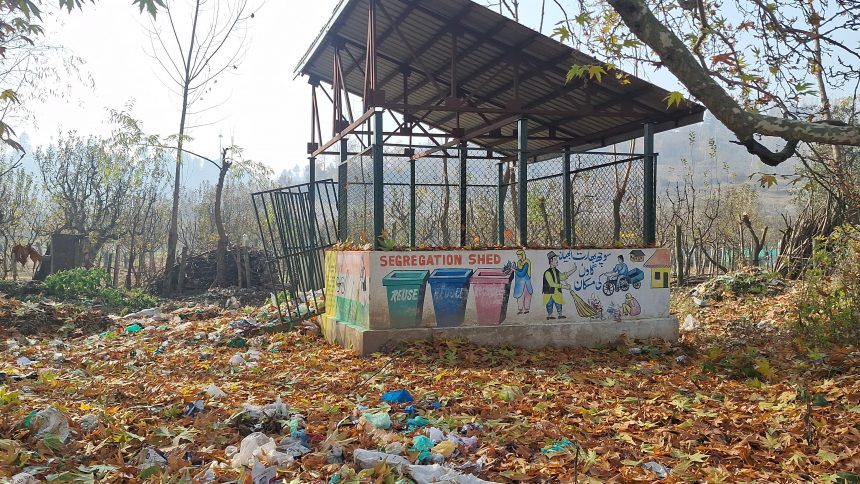Srinagar, Dec 05: Launched with great promise in 2020-21, Jammu and Kashmir’s Swachh Bharat Mission Grameen (SBM-G) Phase II aimed to revolutionize solid waste management in rural areas. However, four years on, the project has drawn sharp criticism from residents and experts alike.
Under the scheme, thousands of waste segregation sheds, dustbins, soak pits, and compost pits to manage waste at the Gram Panchayat level were set up. Yet, the program’s execution has raised serious concerns.
Locals allege that most segregation sheds were built irresponsibly near water bodies or public spaces without considering environmental guidelines or consulting the Pollution Control Board. Instead of improving waste management, these sheds have become dumping grounds, causing health and environmental hazards for nearby residents.
Residents also pointed out flaws in the program’s implementation. “The government didn’t educate villagers on waste segregation before setting up these sheds,” said Aijaz Dar from Anantnag. “There was no public awareness campaign or training to teach people how to separate organic and inorganic waste. Without this, the entire initiative was doomed from the start.”
Tasaduq Rashid from Shopian added, “The authorities should have consulted environmental experts before constructing these facilities. Instead, they wasted funds on incomplete and poorly planned projects.”
“The situation has only worsened,” said a Handwara resident. “We used to manage waste responsibly, but these sheds have become eyesores, filled with unsegregated waste and breeding pests.”
Environmental activist Raja Muzaffar from Budgam criticized the project’s flawed approach. “The program lacked proper planning and groundwork,” he said. “Waste segregation should start at the household level. The government should have spent three to four months educating people about separating organic and non-organic waste before implementing large-scale measures.”
Experts also question the project’s infrastructure. “Instead of focusing on segregation at the source, they constructed pits and sheds that serve little purpose. Villages need Material Recovery Facilities (MRFs) and incinerators capable of handling high temperatures for recycling waste,” Muzaffar added.
A resident of Baramulla, Zahid Wani, expressed his disappointment. “The trash bins installed here are overflowing, emitting unbearable smells and attracting flies. Sanitation workers hired initially stopped working because they didn’t receive timely payments. The situation has worsened since then,” he said.
Arif Ahmad of Budgam echoed similar concerns he said, “The segregation sheds are hardly used for their intended purpose. Unsegregated waste is dumped without any accountability, making these sheds breeding grounds for disease,” he added.
A senior doctor from the Directorate of Health Services Kashmir highlighted the risks associated with unmanaged waste. “Open waste creates breeding grounds for rodents and insects, which spread diseases. People exposed to wastewater risk illnesses like giardiasis, hepatitis, and severe stomach infections,” the doctor explained.
Residents are particularly alarmed as many sheds are dangerously close to vital water sources. “This segregation shed is right next to two major water bodies. How can this be allowed?” questioned Farooq Ahmad Wani, a senior citizen.
Adding to the frustration, locals have pointed out alleged corruption in the project. “Funds were withdrawn, but there was no accountability for whether these facilities were even functional,” said a senior resident.
Despite repeated attempts, the Director of Rural Development Kashmir was unavailable for comments.








